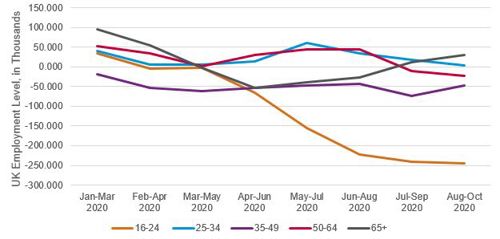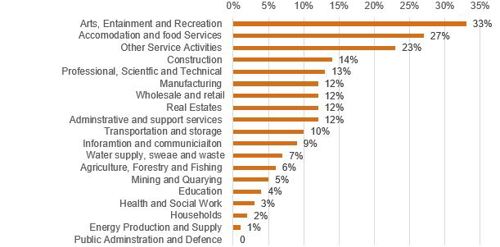
The impact of COVID-19 on young people and their careers.
Laura Carver, Planning Graduate in our Economic Planning team, shares her thoughts on the impact of COVID-19 on young people and the response from local authorities.
Unemployment, as a result of the COVID-19 pandemic, has hit young people particularly hard, threatening to undermine the prospects of success for a whole generation. But, local authorities have come up with some innovative and creative solutions.
Between July and September 2020, the UK saw the largest quarterly rise in redundancies since the 2009 global financial crisis. Breaking these figures down highlights the disproportionate impact on those aged 16-24. This cohort saw around 200,000 redundancies during this period.
Figure 1: UK Employment level by age (16 years and over), cumulative growth from January to October 2020
Source: ONS Labour Force Survey, 2020

This is likely to result from the large numbers of people in this age group working in sectors such as hospitality and the arts. As the table below shows, these parts of the economy have been particularly hard hit by the measures that have been put in place to stem the spread of the virus.
Figure 2: Percentage of employee jobs furloughed by sector, October 2020
Source: HMRC, Coronavirus Job Retention Scheme Statistics, October 2020

Improving youth participation in employment has always been a priority for councils. They realise the importance to people of having a sense of purpose, particularly at the start of their careers. Also, retaining their young people in their areas is key to the vitality of communities. Moreover, authoritative studies have shown that long periods of economic activity can blight careers, particularly in their early stages. (1)
At the national level, the government has launched the ‘Kickstart Scheme’ to provide funding for job placements for 16 to 24-year olds on universal credit who are at risk of long-term unemployment. However, it is at the local level that ideas can be found that arguably will be more effective than sweeping national policies.
Durham City Council have set up Durham Works mobilising social media to put young people in touch with training and employment opportunities. The support is offered by specialist learning providers who deliver tailored training to help young people overcome barrier to progress with their career.
In 2019, Hampshire County Council launched a Levy transfer scheme which supports the expansion of apprenticeship recruitment across the county by allowing the transfer of uncommitted funds from the Apprenticeship Levy, a national scheme that raises money for Apprenticeships in England. Since January 2020, the Council have approved 150 Levy transfers.
Derbyshire County Council identified the risk of young people becoming NEET (not in employment and training) at the end of school. They introduced the I-step up Re-engagement programme which provides tutors to young people to help navigate and support young people addressing wider issues that are impacting on their future job prospects.
In these initiatives, local authorities are galvanising networks and focussing on people’s individual needs. In so doing they are assisting employers and young people’s career prospects at the same time. It is these skills that will be critical if the UK is to head off threat posed by the pandemic to life chances of the next generation of wealth creators.
Get in touch with Laura Carver to talk more about the impact of COVID-19 on young people.
- Share
You may also be interested in



